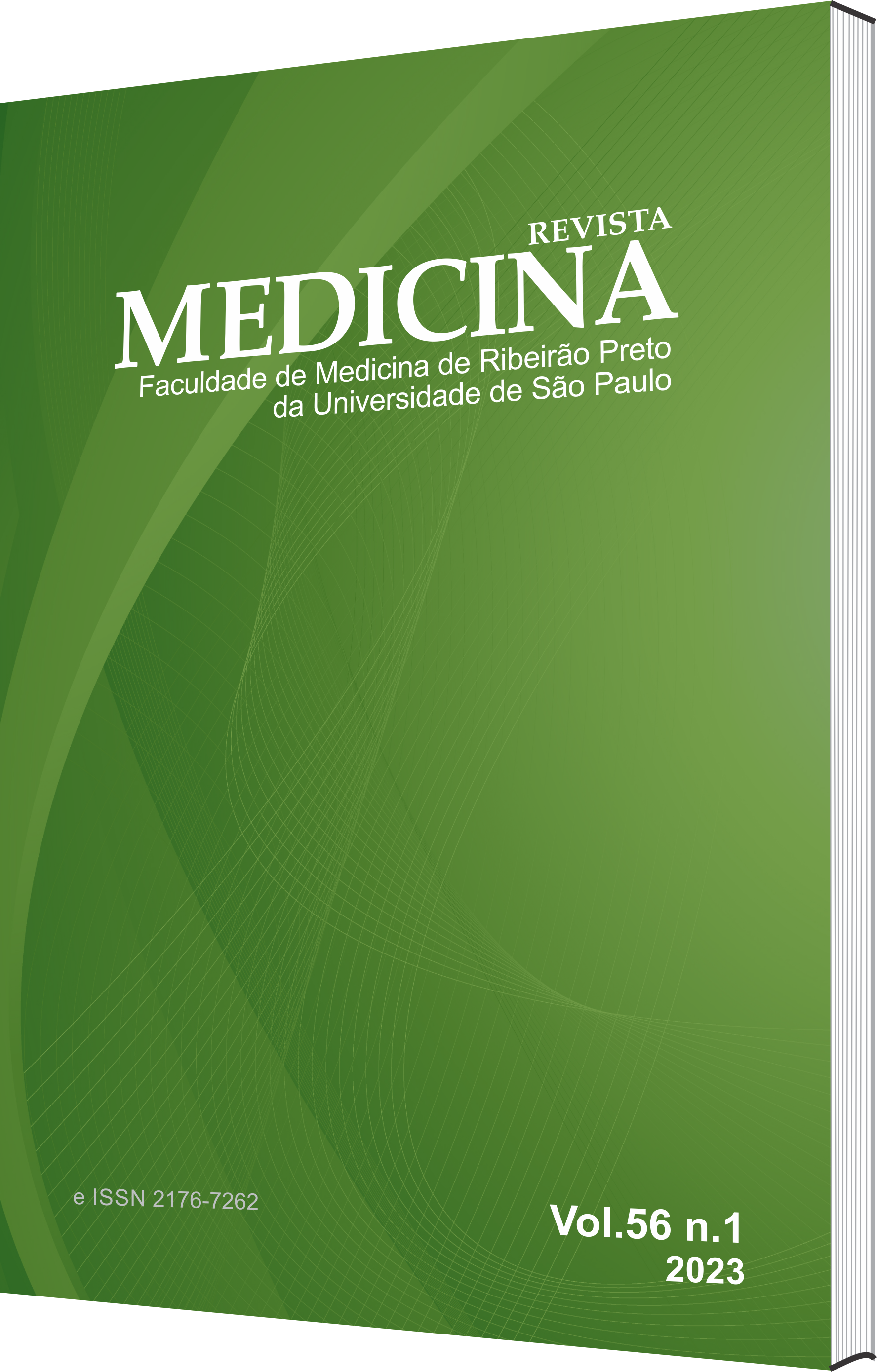Adult eating behavior at the beginning of the COVID-19 pandemic
DOI:
https://doi.org/10.11606/issn.2176-7262.rmrp.2023.201763Keywords:
Eating behavior, COVID-19, PandemicAbstract
Introduction: Difficulties in accessing food and social distancing triggered more anxiety, stress and consumption of low-cost and ultra-processed foods. Objective: To investigate changes in eating behavior and its relationship with socioeconomic aspects. Method: Study conducted virtually between May and June 2020 with 949 adults, with questionnaires on socioeconomic data, changes in eating behavior, frequency of food consumption and the TFEQ-21. The analysis was performed descriptively and the TFEQ-21 according to the scores of each factor. The relationship between the variableswas analyzed using Pearson's correlation test. Results: 63% considered cooking more food, 41% and 38% said they were more likely to eat with company and in peace, respectively. 38.6% reduced fast-food purchases, but 43.2% increased food consumption and 41.8% consumption of sweets. In women, the higher the BMI, the greater the emotional eating and cognitive restriction (p<0.001). In these, emotional eating was greater if they did not have children or higher education (p<0.001), and the restriction was greater with physical activity, not having a stable relationship, having children (p<0.001), employment and higher education (p<0.001). 0.05). In men, emotional eating was related to higher BMI (p<0.05) and both variables were related to physical activity (p<0.001). Conclusion: Changes such as cooking more, reducing fast food, eating calmly and with company were observed compared to before the pandemic. It is noted that in women there is a greater relationship between restriction and emotional eating with various aspects of the social and economic context.
Downloads
References
WHO Health Emergency Dashboard. WHO (COVID-19) Homepage. https://Covid19.who.int/region/amro/country/br (acessado em: 07/06/2021).
Müller O, Neuhann F, Razum O. Epidemiologie und Kontrollmaßnahmen bei COVID-19 [Epidemiology and control of COVID-19]. Dtsch Med Wochenschr 2020; 145(10):670-674. https://doi.org/10.1055/a-1162-1987
Rogers JP, Chesney E, Oliver D, Pollak TA, McGuire P, Fusar-Poli P, et al. Psychiatric and neuropsychiatric presentations associated with severe coronavirus infections: a systematic review and meta-analysis with comparison to the COVID-19 pandemic. Lancet Psychiatry, 2020; 7: 611–27. https://doi.org/10.1016/S2215-0366(20)30203-0
Pear RL. Weight Stigma and the “Quarantine‐15”. Obesity 2020, 28: 1180 1181. https://doi.org/10.1002/oby.22850
Ingram J, Maciejewski G, Hand CJ. Changes in diet, sleep, and physical activity are associated with differences in negative mood during COVID-19 lockdown. Front. Psychol. 2020;11:588604. https://doi.org/10.3389/fpsyg.2020.588604
Rodgers RF, Lombardo C, Cerolini S, Franko DL, & Omori M, et al. The impact of the COVID‐19 pandemic on eating disorder risk and symptoms. Int J Eat Disord. 2020; 53 : 1166-1170. https://doi.org/10.1002/eat.23318
Ammar A, Brach M, Trabelsi K, Chtourou H, Boukhris O, Masmoudi L, et al. Effects of COVID-19 Home Confinement on Eating Behaviour and Physical Activity: Results of the ECLB-COVID19, International Online Survey. Nutrients, 2020. 12(6), 1583. https://doi.org/10.3390/nu12061583
Silva Filho, OJ, Gomes Junior, NN. The future at the kitchen table: COVID-19 and the food supply. Cadernos de Saúde Pública 2020; 36(5):e00095220. https://doi.org/10.1590/0102-311X00095220
Ribeiro G, Santos O. Recompensa alimentar: mecanismos envolvidos e implicações para a obesidade. Revista Portuguesa de Endocrinologia, Diabetes e Metabolismo. 2013. Volume 8, Issue 2. Pages 82-88. ISSN 1646-3439. https://doi.org/10.1016/j.rpedm.2013.09.001
Dingemans A, Danner U, Parks M. Emotion Regulation in Binge Eating Disorder: A Review. Nutrients 2917, 9, 1274. https://doi.org/10.3390/nu9111274
Silva L, Gomes AR. Desordens alimentares no desporto: situação atual e perspectivas futuras no estudo dos fatores psicológicos. Psicol Clín. 2012; 24(2): 83-100. https://doi.org/10.1590/S0103-56652012000200007
Natacci LC, Ferreira Junior M. The three factor eating questionnaire - R21: tradução para o português e aplicação em mulheres brasileiras. Rev. Nutr. Campinas 2011; 24(3):383-394. https://doi.org/10.1590/S1415-52732011000300002
Taragano R, Alvarenga M. Fundamentos teóricos sobre mudança comportamental. Nutrição Comportamental.p.1-4. 2ª Ed. Manole; 2019.
Freitas D, Oliveira BM, Correia F, Pinhão S, Poínhos R. Eating behaviour among nutrition students and social desirability as a confounder. Appetite. 2017; 113:187-192. https://doi.org/10.1016/j.appet.2017.02.036
Stunkards AJ, Messick S. The three-factor eating questionnaire to measure dietary restraint, disinhibition and hunger. Journal of psychosomatic research 1985; v. 29, n. 1, p. 71-83. https://doi.org/10.1016/0022-3999(85)90010-8
World health organization (WHO). Global data base on Body Mass Index. 2006.
Steele EM, Rauber F, Costa CS, Leite MA, Gabe KT, Louzada MLC et al. Mudanças alimentares na coorte NutriNet Brasil durante a pandemia de COVID-19. Rev. Saúde Pública, 2020; 54: 91. https://doi.org/10.11606/s1518-8787.2020054002950
Costa C dos S, Steele EM, Leite MA, Rauber F, Levy RB, Monteiro CA. Body weight changes in the NutriNet Brasil cohort during the covid-19 pandemic. Rev. saúde pública [Internet]. 2021Mar.4 [cited 2022Sep.26];55:1. Available from: https://www.revistas.usp.br/rsp/article/view/182843
Herle MP, Kan C, Jayaweera K, Adikari A, Siribaddana S,Zavos HMS, et al. The association between emotional eating and depressive symptoms: a population-based twin study in Sri Lanka. Glob Health Epidemiol Genom 2019. ;4:e 4. https://doi.org/10.1017/gheg.2019.3
Janjetic MA, Rossi ML, Acquavía C, Denevi J, Marcolini C, Torresani ME. Association Between Anxiety Level, Eating Behavior, and Nutritional Status in Adult Women. J Am Coll Nutr 2020; 39(3):200-205. https://doi.org/10.1080/07315724.2019.1633970
Scarmozzino F, Visioli F. Covid-19 and the Subsequent Lockdown Modified Dietary Habits of Almost Half the Population in an Italian Sample. Foods 2020; 9(5): 675. https://doi.org/10.3390/foods9050675
Downloads
Published
Issue
Section
License
Copyright (c) 2023 Paula Victoria Sozza Silva Gulá, Tatiane Possani, Sebastião de Sousa Almeida, Telma Maria Braga Costa, Maria Fernanda Laus

This work is licensed under a Creative Commons Attribution 4.0 International License.







